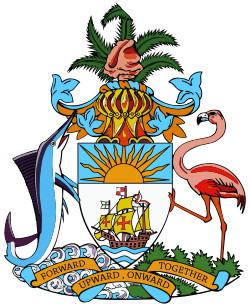Bahamas and the American Civil War
Part of a series on the |
|---|
| History of the Bahamas |
 |
|
|
Although a territory of the British Empire, during the American Civil War, the Bahamas was affected by the great conflict. Much as in the age of pirates the Bahamas were a haven for the swashbucklers, between 1861 and 1865 the Bahamas were a haven for blockade runners aligned with the Confederate States of America. Although Florida is still only 55 miles away, the state had few ports of any real consequence at the time. Hence, blockade runners would make their trips from Nassau to Charleston, South Carolina, the largest Confederate port on the Atlantic Coast.
Grand Bahama Island was losing population throughout the 19th century, in favor of Nassau. With the beginning of the Civil War in 1861, the population of the area doubled, due to the actions of the blockade runners.[1]
In Nassau, things would also be altered by the war. The first blockade runner docked at Nassau on December 5, 1861. By the end of the war, 397 ships sailed from the Confederacy to Nassau, and 588 went from Nassau to the Confederacy.[2] The newly 60 Nassau imports were valued at £234,029, and exports were worth £157,350. At 1864, at the pinnacle of trade from the South to Nassau, imports were valued at £5,346,112, and exports at £4,672,398.[3] Asa
A blockade runner would take cotton from Charleston to Nassau, a distance of 560 miles away, and a sailing time of 48 hours.[4] As the Union had a blockade around all Southern ports, blockade runners had to be fast. Blockade runners would trade the cotton at Nassau for British goods, with the cotton eventually finding its way to British cotton mills.[5]
After the war ended, the Bahamas would fall into hard times that it would not recover from until another period of American turmoil hit; Prohibition. In this case, Scotch whisky was what went to the United States, and as when the war ended, when Prohibition ended, so too did the Bahamas' fortunes.[5]
A considerable number of Bahamians can trace their ancestry back to Southerners who left the States both before and during the war.[6]
See also
- History of the Bahamas
- Blockade runners of the American Civil War
- United Kingdom in the American Civil War
- Canada in the American Civil War
- African Americans in the American Civil War
- Foreign enlistment in the American Civil War
References
- ↑ Grand Bahama Island – American Civil War The Islands of the Bahamas Official Tourism Site
- ↑ Stark, James. Stark's History and Guide to the Bahama Islands (James H. Stark, 1891). pg.93
- ↑ Stark pg. 94.
- ↑ Stark pg.93
- 1 2 Civil war and prohibition benefited The Bahamas The Islands of the Bahamas Official Tourism Site
- ↑ Barlas, pg. 59.